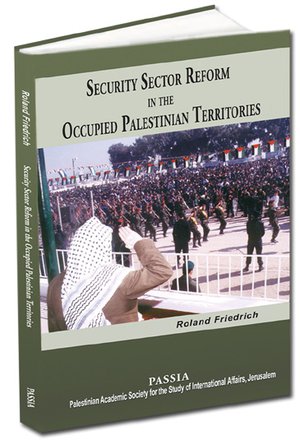Security Sector Reform in the Occupied Palestinian Territories
This study was written against the backdrop that since the outbreak of the second Intifada in 2000, numerous calls for a comprehensive reform of Palestinian institutions have been made, with reform of the Palestinian security sector being a key factor. The book examines Palestinian security sector reform in the period from September 2000 until October 2004, marked by renewed Israeli occupation of the West Bank, the devastation of the PA, and external pressure to overhaul the remaining Palestinian governing institutions. The paper looks at and analyses the actual contents and objectives of security sector reform in the Palestinian context, the political actors engaged in the reform process, their motivations, as well as the political and operational problems associated with reshaping the Palestinian security institutions. Some light is also shed on the more general ob¬stacles that security sector reform faces in the context of state formation.
Overview
Since the outbreak of the second Intifada in 2000 and the simultaneous end of the Oslo process,[2] numerous calls for a comprehensive reform of Palestinian institutions, especially the PNA, have been made from both inside and outside the Occupied Territories. These demands have become especially pressing over the last year as the PNA, indeed the whole Palestinian political system, has found itself facing its most acute crisis since the establishment of limited Palestinian self-rule in 1994. On the domestic level, Palestinian senior officials and legislators, political leaders, and civic organizations, as well as citizens from all across the spectrum have urged the PNA to improve its performance and transform itself into an effective set of institutions capable of meeting the basic needs of the Palestinian people. At the same time, international demands for change have been no less evident: Palestinian reform has emerged as a key ingredient in Israeli and United States (US) Middle East diplomacy and is one of the core elements of the Quartet’s ‘Road Map to Israeli-Palestinian Peace.’ [3]
A key factor in this context is the reform of the Palestinian security sector, in particular its police forces and intelligence services and their political oversight and control mechanisms.[4] The performance of these agencies over the last ten years has been widely criticized, by the Palestinians due to their inability to guarantee law and order and to provide protection against Israeli attacks, and by the Israelis, for not fulfilling their task of preventing violence against their state.
However, the Occupied Territories constitute a unique backdrop for efforts of Security Sector Reform (SSR). Unlike in other political contexts – such as Eastern Europe or Africa – the target for SSR in the Palestinian case is not a sovereign state, but a transitional regime with contested legitimacy and a disputed territorial basis.[5]
Against such a backdrop, this research paper will examine Palestinian SSR in the post-Oslo phase,[6] a scenario marked by renewed Israeli occupation of the West Bank, the virtual devastation of the PNA, and external pressure to overhaul the remaining Palestinian governing institutions. The underlying question is threefold: first, what are the actual contents and objectives of SSR in the Palestinian context? Secondly, who are the political actors engaged in the reform debate and process, and what are their motivations? And thirdly, what are the political and operational problems associated with the efforts to reshape the Palestinian security institutions? By undertaking such an inquiry, this paper will also shed some light on the more general obstacles that SSR faces in the context of state formation.
Introduction
1. Structure of Analysis
2. Theory and Methodology
The Concept of Security Sector Reform (SSR)
Reforming the Palestinian Security Sector
1. The Political Dimension
a) External Political Setting
i. Regional Actors and SSR: Israel, Egypt, and Jordan
ii. Global Actors and SSR: US and EU
b) Internal Political Setting
i. Power Structure of the Palestinian National Authority
ii. Political Legitimacy of the Palestinian National Authority
iii. Strategic Priorities of Key Security Actors
2. The Institutional Dimension
a) Proliferation of Security Orders
b) Command and Control Structure
c) Size of Forces
d) Legislative Basis
e) Civil-Democratic Oversight Mechanisms
f) Culture of the Security Sector
3. The Economic Dimension
4. The Societal Dimension

